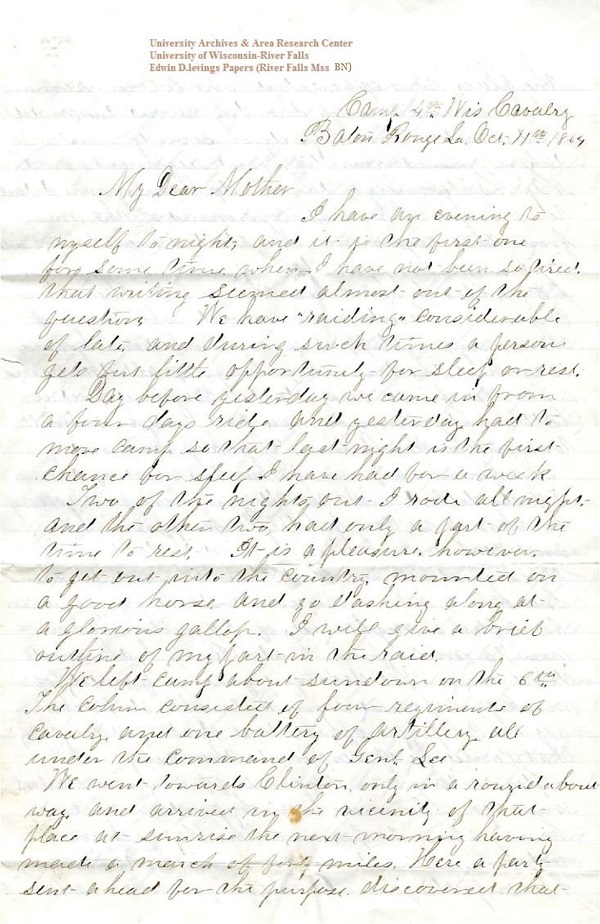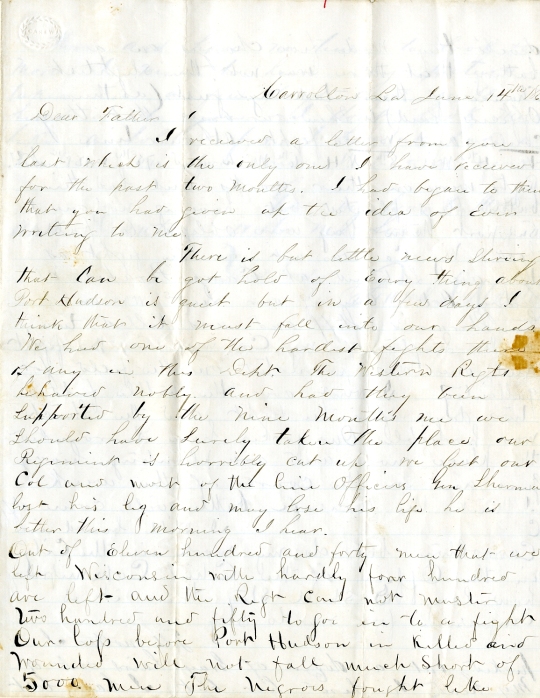From The Prescott Journal of December 24, 1864. During the months of October, November, and December, 1864, the 2nd Wisconsin Cavalry was engaged in “heavy scouting duty.” Lieutenant Colonel Dale, along with 250 men, “encountered a large body of the enemy on the Vicksburg road, near Yazoo City on December 2. After fighting some time, the enemy appeared in such numbers as to outflank the force of Lieutenant Colonel Dale. After twice repelling the charges of the enemy, Dale’s forces were withdrawn, the Lieutenant Colonel being wounded in the ankle. . . . Twenty-seven were reported as taken prisoners.”
Company D of the 2nd Wisconsin Cavalry was the Saint Croix Lancers/Rangers, Company L was the Eau Claire Rangers, and Company M, while not a company composed mainly of men from our counties, contained many men from Prescott. From the list of wounded, it would appear that of these only Company L was along for the “raid.”
Daring and Successful Raid.
Losses of the Second Wisconsin Cavalry.
The telegraph brought a brief account of a recent raid by our troops from Vicksburg. The Herald of that city brings a fuller report. The expedition, under command of Col. OSBAND, left Vicksburg November 25th, and returned on the 4th inst. It was designed to cut off the supplies which the enemy were drawing over the Mississippi Central Railroad from the rich districts of the Yazoo and the Big Black rivers. After a sharp-fight, it was successful in burning the railroad bridge across the Big Black, and tore up a mile of track. the 2d Wisconsin, Major DALE commanding, burnt Vaughn’s Station, warehouse, steam-water tank, destroyed a mile and a half of track, with $70,000 worth of railroad supplies, 100 bales of cotton, 20 barrels of salt, with a considerable amount of corn and wheat.
On the 29th ult. the expedition destroyed still more of the road, 1,200 bales of cotton, and a large amount of wheat and corn. They next proceeded to Goodman’s Station, burnt the railroad buildings and 1,300 bales of cotton, two engines, four cars, and a large amount of other supplies. Thirty miles of road was left a ruin, which cannot be put in order in less than sixty days.
Having accomplished their object, the expedition returned to Yazoo City on the 29th, in time to baffle the enemy who were seeking to occupy the point before our troops could reach it. After resting on the 30th, Colonel OSHAND, hearing that the rebels were advancing sent out scouts on all the roads at daylight the following day, for information.—The Herald’s account continues :
The enemy were found on each road in more or less force, but strongest on the Vicksburg road, on which Major N.H. Dale, with 250 men of the 2d Wis. cavalry had been sent. Major Dale drove the enemy beyond the junction of the Yazoo City and Benton roads. Here, at some negro quarters, the enemy developed more strength, and two companies were dismounted to dislodge them. Finding them about to be flanked, two other companies were dismounted and sent forward to cover the flanks of those now fighting.—Just beyond these quarters was a dense under growth of scrub oak in which quite a large force of the enemy were concealed, who now made a furious assault on the small force of Major Dale, whose gallantry was conspicuous, was wounded in the ankle and fainted from loss of blood and pain, while rallying his men, who were somewhat surprised by this sudden and unexpected attack. The gallant men, however, reformed, and twice repulsed charges of the enemy with considerable loss. The command was then withdrawn.
The best informed officers estimated the number of the enemy at this place from 1,5000 to 3,000, and his loss at 75 killed and wounded.
The enemy being in strong force, and partly infantry, Col. OSHAND did not deem it prudent to risk general engagement, and accordingly fell back across the Yazoo, and returned to Vicksburg without further loss.
HENRY R. BOARDMAN, Esq., of the 2d Wisconsin, sends the following list of the casualties in that regiment:
Company C.
Wounded—Albert M. Parker, in hand; Richard Ladd, in leg.
Prisoners—Lieut. S. Woodard; Sergeants Bellrode, Fisher, Alby, and Ellison; Corporals Donerar, Goodwin and West; W. Lasuer farrier; M. Mott, blacksmith; W. McCormick, saddler; Privates John A. Brown, H.J. Cook, J. Corning, W.P. French, T. Howard, M. Landgraff, M Oleson, H. Gibbs, W. Whiting, J. Lowden, Pierce S. Ransomer.
This company, which was dismounted, except every fourth man who held the horses in the rear, and formed the left of the line of battle, was out-flanked and captured in a body. Many of the men cannot but be wounded or killed as they were last observed in the face of the enemy and in the heat of fierce conflict.
Company F.
Wounded—Ira Burton, in shoulder; Stuart Craig, in side; William Noble, in side—all severe, but not thought mortal.
Prisoners—Corp. James Logne; privates Henry Cate and Josiah Williams, the latter known to be severely, if not mortally wounded in the hip.
Company F occupied the right of the dismounted line of battle, and led on by Lieut. Hamilton gained an advanced position and being covered by a fence held their ground until the “recall” was sounded, when they reluctantly fell back to their horses.
Company I.
Wounded—Lieut. Tinkham, slightly in ankle; Amos Sperry, in arm, slightly.
Prisoners—Joseph Vangarder, James Cullen,—both severely wounded.
Company I occupied the center, and officers and men deserve great credit for their stubborn resistance of two rebel charges, never flinching until ordered back by Maj. Dale.
Company L.
Killed—Joshua T. Thompson and George Gray, both left on the field.
Wounded—Anton Zittel, slightly in shoulder.
Company L also lost eight horses killed on the spot, as they were formed mounted across the road in rear of the center, to cover the retreat of the dismounted companies. Orderly Sergeant P. Hartman had command of the company in the absence of the Captain, and is well spoken of by the boys.
Companies H and B, the latter temporarily under command of Lieut. Poynter, of Co. F, did all that the time and ground would permit in holding the rebels at bay until the command could form an orderly retreat.
1. Military History of Wisconsin, by E. B. Quiner (Chicago, 1866), chapter 51, page 907 (available in the UWRF Archives and in the Chalmer Davee Library main stacks, E537 .Q56 1866).





